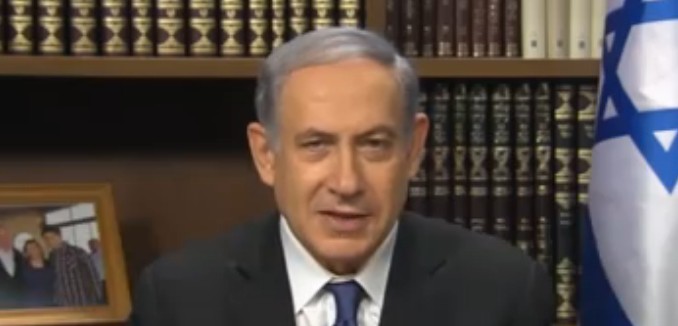Israeli Prime Minister Benjamin Netanyahu laid out the case against the nuclear deal with Iran in a presentation streamed over the internet today. The video is embedded below.
After saying that “the deal doesn’t block Iran’s path to the bomb, it paves it,” Netanyahu discussed the “three fatal flaws” of the deal. Those flaws are that it allows Iran to build a nuclear bomb by adhering to the deal for fifteen years, when most of the deal’s limitations expire; that it won’t prevent Iran from developing a nuclear bomb covertly; and that it will reward Iran with billions of dollars in sanctions relief.
If Iran abides by the deal, Netanyahu said, then by the end of fifteen years Iran will have a “sophisticated nuclear infrastructure” capable of producing many bombs in a matter of days. Netanyahu pointed out that President Barack Obama “said as much in an interview with NPR.”
Netanyahu raised the fear that Iran would violate the deal and evade inspections, pointing out that as good as American and Israeli intelligence agencies are, they were long unaware of the enrichment facilities at Natanz and Fordow and had been unaware of the plutonium reactors that were being built in Syria.
The prime minister also said that if Iran diverts just ten percent of the billions it will receive as part of sanctions relief to any terror group it sponsors, then that group would become a “terrorist superpower.”
Netanyahu also addressed the argument that Israel’s objections to to the deal were somehow encouraging war. Netanyahu pointed out that Israel faces Iranian-sponsored terror on three fronts (Hamas in Gaza, and Hezbollah in Lebanon and Syria) and therefore wants peace. What Israel fears is that the windfall resulting from the deal will increase the aggressiveness of Iran’s proxies on its borders.
He also pointed out that even opposition leader Isaac Herzog, who ran against him in March, said that there is “no daylight” between them regarding the Iranian nuclear threat. He then called on people to judge the deal “on its substance,” observing that the “more people know about the deal, the more they oppose it.”
Netanyahu took several questions at the end of the broadcast. When asked if there was any deal he would accept, Netanyahu said that he would have accepted a deal that allowed Iran a much lower level of enrichment and made sanctions relief contingent upon Iran changing its behavior. He also pointed out that while proponents of the deal are now saying that the alternative to the deal is war, the administration was saying just a a few weeks ago that the alternative to a bad deal is no deal.
Netanyahu was also asked how he thought Congressional rejection of the deal would effect negotiations. He answered that the sanctions were supposed to make Iran have to choose between its nuclear program and commerce, but that the deal gave them both so that “Iran could have its yellowcake and eat it too.” Netanyahu acknowledged that sanctions could be weakened in the short term by Congressional rejection of the deal, but that the American economy was 40 times the size of the Iranian economy, so businesses, when forced to choose, would choose to do business with the United States.
In a question about why a number of Israel’s former security chiefs supported the deal, Netanyahu answered that Israel is an open country and that anyone is free to dissent. However, he pointed out that the overwhelming consensus in Israel was opposed to the deal. He ended the response by saying, “Here’s the bottom line: don’t let the world’s foremost terrorist regime get its hands on the most dangerous weapons. Oppose this bad deal.”
[Photo: Jewish Community Webcast screenshot ]




